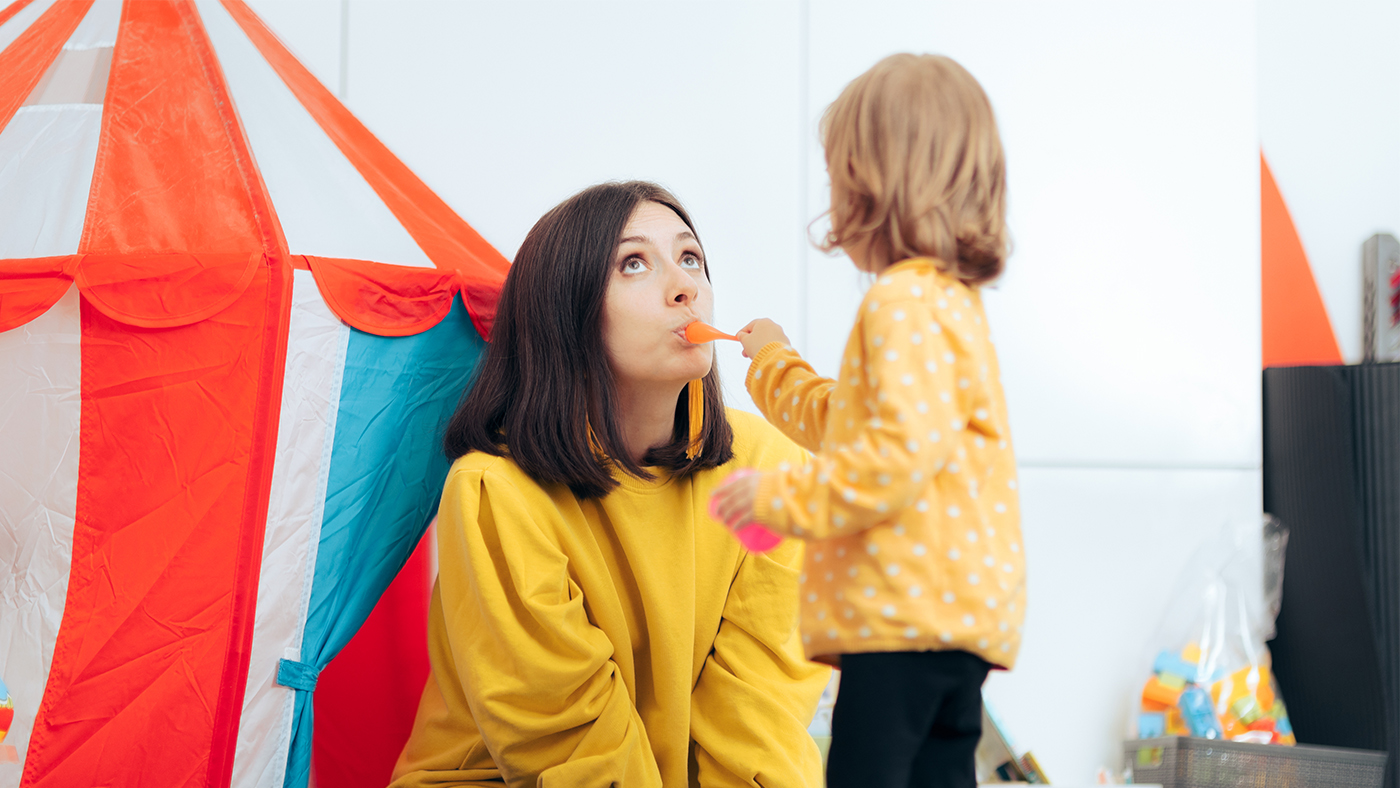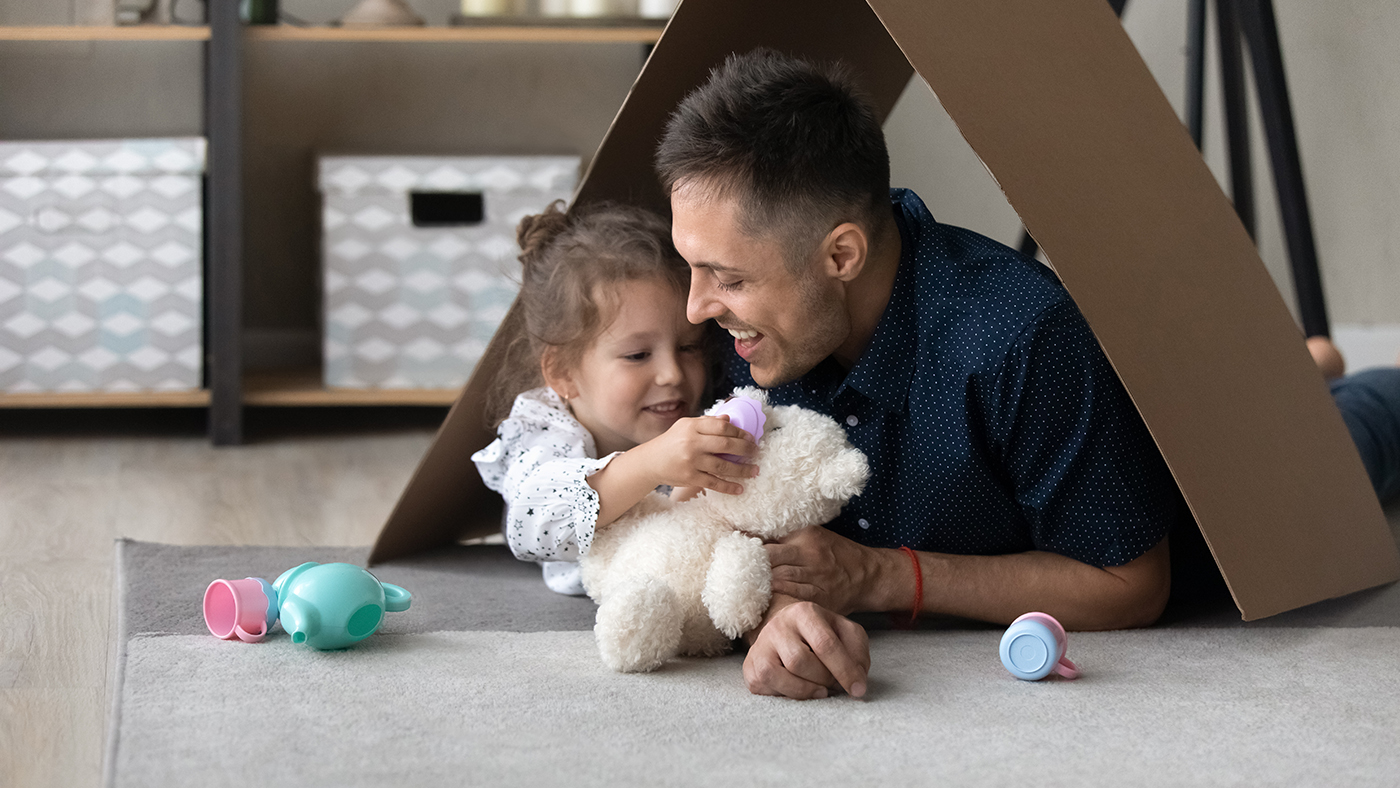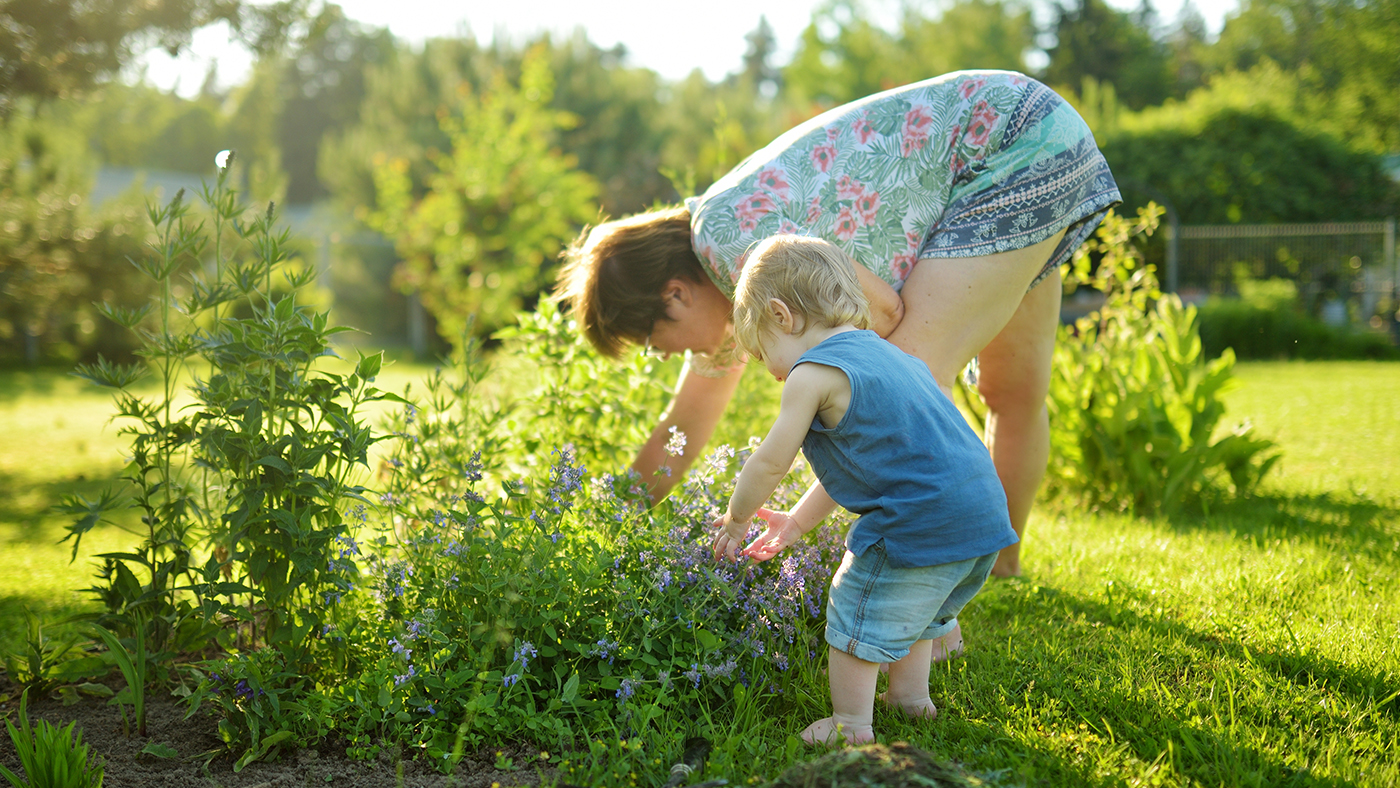How to play with your child without having to dress up as a princess

I am sitting in our front room, half-dressed as a princess (I cannot fit the costume over my head properly, so it is currently looking like a synthetic, glittery straitjacket for misbehaving grown-ups). My three-year-old is serving me plastic cake from a small red plate. I say serving me, often he is insisting that I put the grotty-looking thing into my mouth and when I resist, he shouts toddler obscenities at me. He’s like a very pushy parent (?) and I am counting down the minutes until I can escape and make a cup of tea, or put the washing away, or do anything other than endure another second of this role play.
Here’s the thing, I don’t think there’s anything wrong with saying that some types of play don’t float your boat. That when your child wants to do the same jigsaw for the 50th time (it’s very common for children to repeat certain types of play), you don’t jump for joy. That you sometimes wish they could play on their own a bit more, if nothing else so that you can swerve the wooden trains.
So, what can be done if playing with your child / children is feeling less than natural? If you’ve lost your playing mojo? Here are a few ideas of ways that you can make playing fun for both of you, no princess costume required (unless that’s your thing!).
Play to your strengths

Take five minutes to write down the sorts of games or play that you enjoy most with your child. Think about those occasions when you lose track of time and are so involved in a game that you forget what else it is you were doing or supposed to be doing. Psychologist Mihaly Csikszentmihalyi1 calls this a state of ‘flow’. When you find your flow, do more of that. Which doesn’t mean that from now on the only thing you do with your child is play football, for example, but if you know that physical play is truly enjoyable then you can plan more of it, or incorporate it in different ways. If you’re happiest outdoors then wonderful, children benefit hugely from fresh air and the outdoors brings a wealth of opportunities for play. Even just being aware of the type of play you enjoy can be helpful. You are more likely to embrace and appreciate these moments while not feeling guilty or struggling on with the role play (can you tell that role play is really not my thing?).
Get creative with your play
In sharp contrast to everything I’ve just said, it is also worth considering if you’ve got into a bit of a play rut. It’s easily done, we all slip into routines that we don’t ever remember actually choosing. But play is a brilliant way of tapping into your creativity. Your child will automatically take you on this journey if you allow yourself to be led. Go into a game or playtime leaving your expectations and ‘adult’ rules behind (obviously keeping safety in mind). You might have set up what you believe is a brilliant construction game and your curious toddler comes over and has zero interest in your plans but wants to take the blocks and hide them in the cupboard. That’s ok. Yes, this might be a tad frustrating but as adults we can really learn from this explorative, open-ended play. And actually, I think it can be a relief to know that your child will always find a way to play and doesn’t always require your adult instruction.

Of course, children do need us to provide our knowledge and experience but sometimes try just playing alongside them for a while. Let them set the direction and watch and learn with them. The more you let go, the easier you might find it to do so. You might just find yourself thinking a little more creatively in other areas of life too!
Embrace your inner child
In her book, Ice Cream for Breakfast,2 Laura Jane Williams describes how becoming a nanny changed her whole outlook on life, as she realised that she rarely played, purely for fun. That her routines and lifestyle had become too sensible and that embracing her ‘inner child’ made her feel calmer, happier and solved some of her ‘adult’ problems.
Sometimes we see the word play and think that it means ‘childish’ or silly but actually playing in a ‘childlike’ way can be invigorating and great fun. As adults we can become lost amid the heaviness of work priorities and managing schedules, everything ends up with a ‘grown up’ outcome. When was the last time you laughed out loud, played with no agenda whatsoever or said yes to some of the crazy ideas our children come up with to fill their days?
Again, watch and learn, your child will lead the way. Watching how children experience the world can be such an inspiration and reality check on what really matters in life.
Playing together doesn’t have to involve ‘an activity’
My father-in-law once told me he wasn’t really the ‘playing’ sort. And yet hours later he was showing my son how to plant tomato seeds, both of them fully engrossed in the experience. Perhaps because play is so often associated with children, it can be easy to think that it is something which adults don’t naturally do. That we must learn to play a game perhaps, set up an activity, try to get involved in their world, while remaining an outsider.

But children love to see US play, and by doing more of it alongside your child, you also model its value.
Sometimes if ask my daughter to do an activity, she will be far less interested than if I just sit down and start something on my own. Then, she is intrigued to see what has got my attention and is often keen to be involved.
Have a think about what you like to play. Perhaps it’s an instrument, or a hobby that you’ve never considered sharing with your children. You might want to get more exercise and fancy trying out some dance videos on YouTube – it’s highly likely your child will want to join you. And this includes the play which happens in everyday life, like when you hear a song you love in the car on the way to nursery, turn it up loud and teach them some of the words (if they are appropriate!).

Parenting is as big a learning curve for adults as it is for children, so please know that tapping into your playful side can take practice. It is completely normal to find certain types of play a bit uninspiring, we are all unique individuals after all, just like our children. Likewise, some days you might have the energy to race around a playground playing tig and other days, less so. Don’t forget to check out your mix of six if you need some ideas!
I know that I’ll have plenty more occasions in future when I’ll be dressed up and asked to eat cake off a plastic plate, that’s just life with a toddler who deserves my attention. In agreeing to play the game he wants for a while, I also model the social skills of sharing ideas, fairness and empathy. But hopefully, in trying out some of the above, I can also have plenty of fun and connection playing in ways that benefit us both too. Just don’t ask me to put on a princess dress!